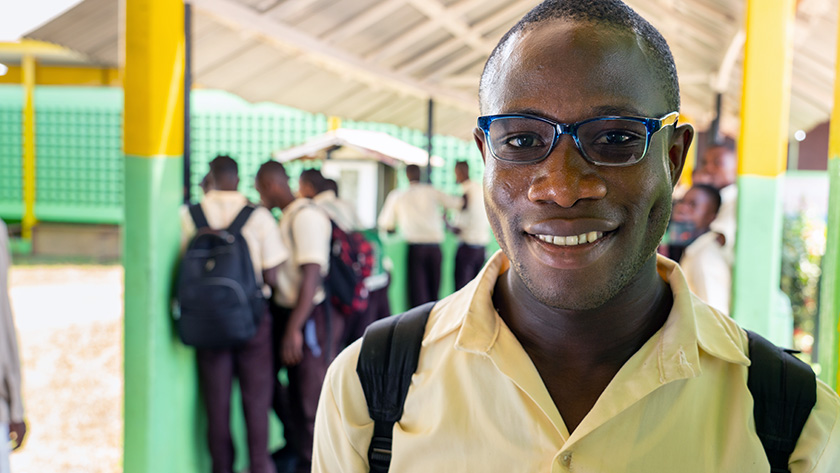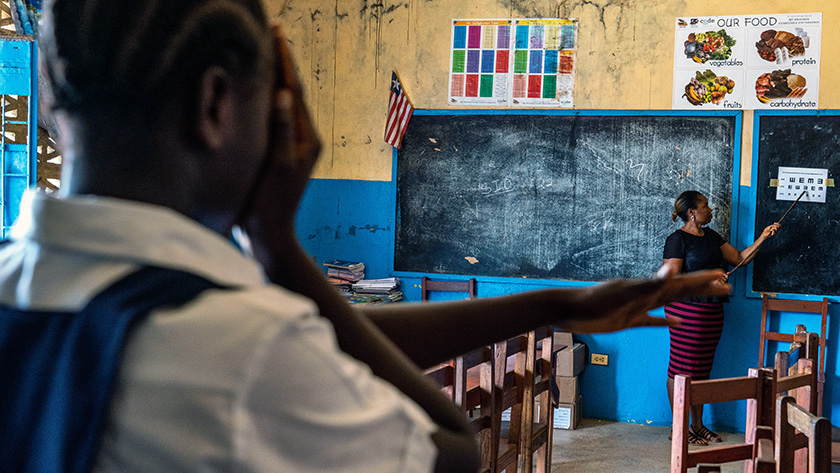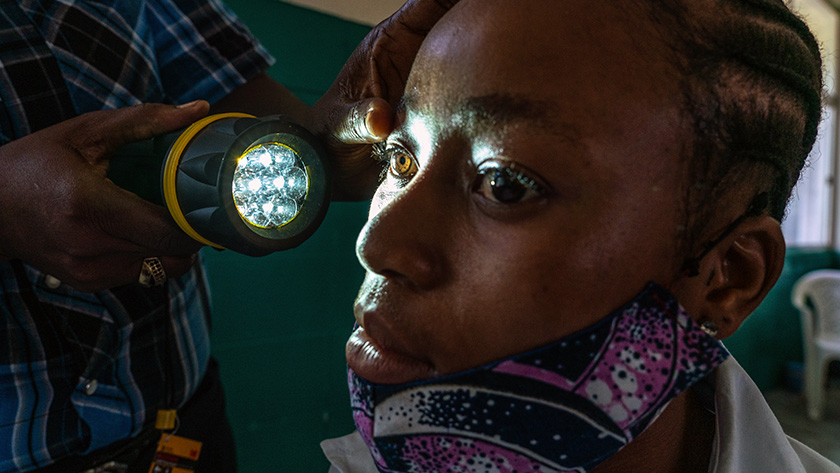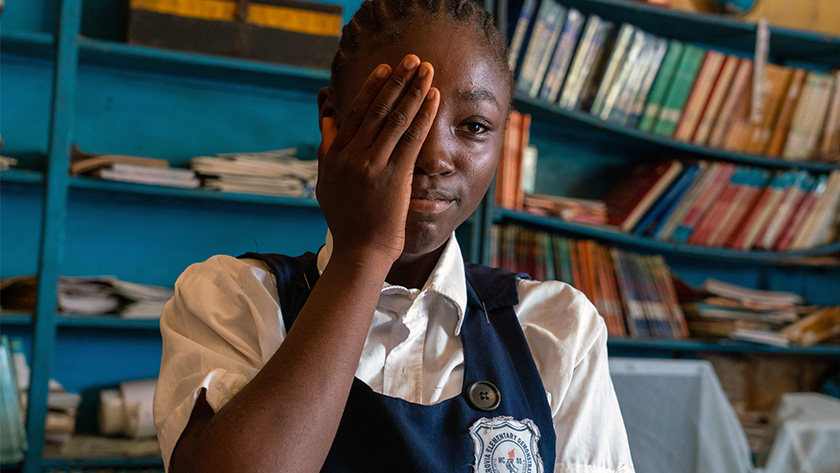Systems orchestrators are leaders and organizations who shape transformational social change behind the scenes by connecting people, providing resources and support, and mobilizing collective, unified efforts. At the Skoll Foundation, we recognized the potential for impact in these types of leaders and organizations several years ago and made an early investment in one that exemplifies this approach: EYElliance.
With its government led national school eye health programs, EYElliance embraces the conviction that every school aged child has the right to sight and equal opportunity to succeed in school. Given the strong connection between vision and learning, EYElliance believes that children should receive their first pair of eyeglasses at no cost from the government and works to enable governments to own this responsibility and pay for it. In Liberia, EYElliance convened a consortium that works in service of the Liberian Ministries of Health and Education to integrate school eye health into policy and practice, a model they intend to scale globally.

In 2017, prior to EYElliance’s work in Liberia, two International Non-Governmental Organizations (INGOs) dedicated to eye health served this West African nation with a population of nearly 5 million people. L V Prasad Eye Institute, based in India, had built the first tertiary eye center in country at the request of former President Ellen Johnson Sirleaf, in the national medical center in the capital city of Monrovia. U.K.-based Sightsavers, alongside the Liberian Ministry of Health, was working primarily in the southeast region, focused on supporting and improving eye health services at government-managed health centers, and supporting the implementation of a School Health Integrated Program.
-Liz Smith, co-Founder of EYElliance
At the time, eye health care in Liberia, especially when it came to treating school age children, was fragmented at best. Dr. Wilhemina Jallah, the Minister of Health, Smith recalls, was so painfully aware of the critical need for vision care, that each time she visited the US, she filled her purse with reading glasses to distribute on her return home.
Today, the landscape of vision care in Liberia is utterly transformed. Within a few short years, the Liberian Ministries of Health and Education have engaged in a system of mutually reinforcing collaboration, working with INGOs to deliver vision screening in schools conducted by trained teachers. The program includes delivery of glasses by eye health professionals, backed by a referral program for more advanced eye care.
In addition, vision services now extend to adults in Liberia, thanks to government-managed training of National Community Health Assistants to perform vision screenings, dispense reading glasses to adults, and refer adults on to more advanced care. We will discuss this aspect of EYElliance’s work in detail in the next piece in this series.
So, how did EYElliance wrangle the moving pieces to accomplish this remarkable level of transformative impact?
Prior to an eye health care convening in South Africa, another Skoll Awardee, Raj Panjabi, CEO of Last Mile Health, introduced Smith and EYElliance co-Founder Jordan Kassalow to President Ellen Johnson Sirleaf to make their case. As it happened, President Sirleaf, who was the keynote speaker at the convening—herself a glasses wearer—had a long-standing concern for the under-developed national eye healthcare landscape.
President Sirleaf was, however, more focused at the tertiary level. When Smith and Kassalow reminded her of the acute need for eyeglasses in her country, she immediately responded. EYElliance had an early champion at the very highest level. The President turned to EYElliance to gather a sub-set of their 60+ members with relevant expertise and convened a working session with EYElliance, their members, and the Ministers of Health and Education, Minister Dahn and Minister George Werner, respectively.
Smith and Kassalow understood that transformative change in the eye health landscape would have to be government-led, and the country was just entering the process of writing its first national school health policy. Thanks to an introduction from Andy Tembon, an EYElliance founding steering committee member and Senior Health Specialist at the World Bank, and collaborative advocacy from Sightsavers, Smith and Kassalow got immediate buy-in from the Director of School Health at the Ministry of Education—and they have continued to prioritize school eye health ever since.

“Without EYElliance, and the coordinated effort of the Consortium, we would not have been able to realize our vision for integrated school health in such a short period of time,” said Acting Director School Health, Elizabeth Hope. “We look forward to building on this momentum as we begin implementation of our next national education sector plan.”
In that very first working session with collaborators from the eye care community and ministerial staff, Dr. Bernice Dahn, the Minister of Health at the time made it clear that this effort could not be positioned as an exploratory pilot program. “I don’t want to hear the word pilot,” Smith recalls her saying. “We are tired of NGOs doing pilots. The money dries up and then where’s the government?”
The message was clear: this would not start at the district level and incrementally scale with a trickle of funding. EYElliance would support the government in a phased national plan. Soon after, the Minister of Health created a brand-new position: a manager for the national eye health program and more recently a procurement specialist for eye health. Until then, says Smith, the program was only aspirational and getting lost in the Noncommunicable Disease Division.
“The vision of the Ministry of Health is to ensure scaled and equitable deployment of eye health services in Liberia including eyeglasses,” said Dr. Joseph Kerkula MD, MSc., Manager of the Liberian National Eye Health Program. “School eye health is an important priority within our national eye health plan because we see our teachers and National Community Health Assistants as a powerful driver of scale and equity. By integrating them into our eye health workforce, we can make immediate improvements in the lives of all Liberians. EYElliance has been instrumental because they see the systems perspective and work with us to build holistic solutions: from training and supply chain to governance and financing. As a result, the National Eye Health Program is achieving the integration of eye health in the education and health sector at an unprecedented pace.”

EYElliance continues to provide technical assistance to build the government’s capacity to carry the work forward. For the first year of implementation, the Liberian Ministry of Education identified 50 schools in Montserrado County for the first phase of the national school eye health program, and 100 teachers to serve as front line vision screeners. An EYElliance project manager maintains a collaborative dashboard that ensures that all partners are regularly sharing progress at the school and district level and meeting their commitments. “This has been critical to forward movement and real time knowledge sharing and problem solving as a group,” says Smith.
The Ministries of Health and Education now have a set of systematized training materials for the national school eye health program—meanwhile L V Prasad Eye Institute and Sightsavers both use these resources to train teachers to perform vision screenings. Under ministerial ownership, there is now a single shared data set and a coordinated referral system.
Maintaining relationships at the ministerial level that can withstand political transitions proved critical, but equally crucial are the relationships with district and city level officials and bureaucrats who could occupy their positions for an entire career. EYElliance aimed from day one to create a sustainable model. To do that required ministerial commitment, technical assistance for training and implementation, an ongoing pool of capital in the education sector, and a force of trained, on-the-ground community health workers to deliver screenings and provide eyeglasses beyond the student population.
EYElliance had already done its homework on how to think about who the long-term payer for this program could be. In the very early days of EYElliance, even before overall strategy had come together, Smith and Kassalow met with Alice Albright, CEO of Global Partnership for Education (GPE), which makes large unrestricted grants to Ministries of Education to support activities beyond teachers’ salaries.
“We came to her with what we knew, and were trying to achieve, and she told us she’d never been more convinced about the importance of health to educational outcomes,” says Smith. “She laid out for us how GPE supports these education plans—they don’t directly fund eye health—but because we were working with the Ministry of Education to improve learning, they could access these funds.”

Fast forward to the present, and the cascading effect has EYElliance working with UNICEF, Clinton Health Access Initiative, and ATscale as similarly positioned partners with other national governments as the implementer at scale to ensure that vision health care is incorporated into national education plans. The goal is to move from 1 to 3 countries in 2021.
EYElliance has catalyzed a sea change shift in the eye health status quo in Liberia—a piece of their work that exemplifies a model of transformative impact. It has orchestrated systems of government, large institutional funders, INGOs and other implementing partners to produce sustainable impact on a massive scale. To fit those puzzle pieces together, to unlock resources and systematize efforts, Smith and Kassalow intentionally lead from behind.
“The government is the doer at scale,” says Smith. This national effort will reach 500,000 Liberian schoolchildren and 1.2 million adults living at the last mile without access to eye health. Former President Ellen Johnson Sirleaf remarked in that first meeting with EYElliance that in her visits to hundreds of schools in Liberia, she had never seen a student wearing eyeglasses. Things look quite different these days.
Want more stories of transformational change on the world’s most pressing problems? Sign up for Skoll Foundation’s monthly newsletter.